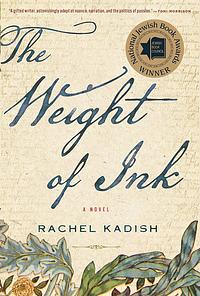Take a photo of a barcode or cover
4.5/5 rounded up. I loved this book - for its structure (back and forth in time and between points of view), its plot and character development, how it grapples with the nature of desire, and mostly for its love of history.
Beautifully written, back and forth between the 17th century and the early 2000s. Loved the premise
of a woman, using her knowledge and brain, to gain knowledge and answers forbidden a woman of the times. And the counter story of two historians, uncovering the story through research and diligence.
of a woman, using her knowledge and brain, to gain knowledge and answers forbidden a woman of the times. And the counter story of two historians, uncovering the story through research and diligence.
This book is about a very interesting period of history, and (more importantly) is an interesting book to read.
The plotting is intricate and immaculate -- at least for unfolding the 17th-century story. The modern part is also plotted well but is far less interesting, and (oddly for a book this length) gives us almost stock characters as protagonists. It is difficult to care too much for Aaron and Helen and their minor battles with the academic in crowd, at least until very near the end.
I was glad every time the book switched back to the world of 'Aleph' and the Rabbi, in which even the minor characters are drawn vividly and fighting their own battles. For the first part of the book, I found the slightly non chronological presentation of 17th-century facts a bit confusing, and wished I had written down some of what letters were written on which date. But the second half of the book is a real page-turner, as the stakes seem ever higher.
Throughout the book, it seemed telegraphed that all characters would be given neat and tidy endings to their story arcs, which I'm not convinced was necessary. This is a minor niggle -- please read and enjoy!
The plotting is intricate and immaculate -- at least for unfolding the 17th-century story. The modern part is also plotted well but is far less interesting, and (oddly for a book this length) gives us almost stock characters as protagonists. It is difficult to care too much for Aaron and Helen and their minor battles with the academic in crowd, at least until very near the end.
I was glad every time the book switched back to the world of 'Aleph' and the Rabbi, in which even the minor characters are drawn vividly and fighting their own battles. For the first part of the book, I found the slightly non chronological presentation of 17th-century facts a bit confusing, and wished I had written down some of what letters were written on which date. But the second half of the book is a real page-turner, as the stakes seem ever higher.
Throughout the book, it seemed telegraphed that all characters would be given neat and tidy endings to their story arcs, which I'm not convinced was necessary. This is a minor niggle -- please read and enjoy!
This is a magnificent book. An historical drama set in London it follows the lives of two women, Ester a scribe to a blind Jewish rabbi and Helen a sick academic historian trying to trace Ester's life through the study of a recently discovered cache of documents. The character development of both women and others in the novel is detailed and compelling. We read Eters letters as she writes them and as Helen reads them. The tale is dense and tightly woven but sustained my interest until the last page.
Critics say this book is little more than a derivative of A.S. Byatt's Possession. I cannot say, as I have never read Possession. Perhaps I will do so now, and compare it against the standard that The Weight of Ink sets.
I loved this book. Set in the 166os and the early 2000s, ranging from Restoration London to 20th-century Israel, and including snippets related to Portugal, Florence, and Amsterdam. Wrestles with big philosophical questions and the quotidian decisions that ultimately make a life.
A masterpiece of history and philosophy and really quite un-putdownable.
I loved this book. Set in the 166os and the early 2000s, ranging from Restoration London to 20th-century Israel, and including snippets related to Portugal, Florence, and Amsterdam. Wrestles with big philosophical questions and the quotidian decisions that ultimately make a life.
A masterpiece of history and philosophy and really quite un-putdownable.
emotional
mysterious
medium-paced
emotional
reflective
sad
medium-paced
Plot or Character Driven:
A mix
Strong character development:
Yes
Loveable characters:
Complicated
Diverse cast of characters:
No
Pun intended...this book is weighty. Yes, it is dense. You might expect that for a book that took 12 years to write. It discusses weighty topics as well. But the storytelling is worth the time it takes to read this tale. The story follows a young female scribe to a rabbi in 1660s London, and two current day academics who find the scribe's writings. Engrossing.
challenging
emotional
hopeful
inspiring
reflective
slow-paced
Plot or Character Driven:
A mix
Strong character development:
Yes
Loveable characters:
Yes
Diverse cast of characters:
No
Flaws of characters a main focus:
Yes
I so enjoyed this story! I guessed how part of it would end, but it didn't matter to me because I didn't guess everything, and I feel like the author wanted the reader to figure it out. I loved the history of it, the restoration of an old home involving a discovery of an historic find--something I've always dreamed of.


